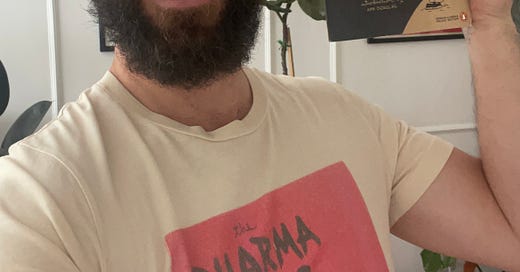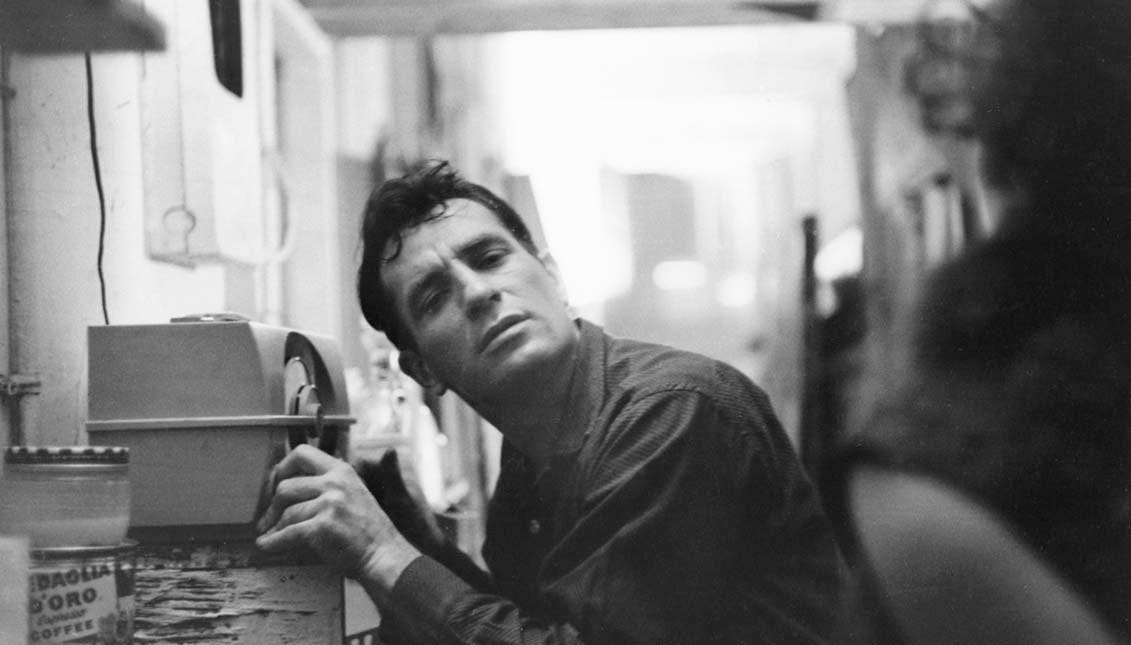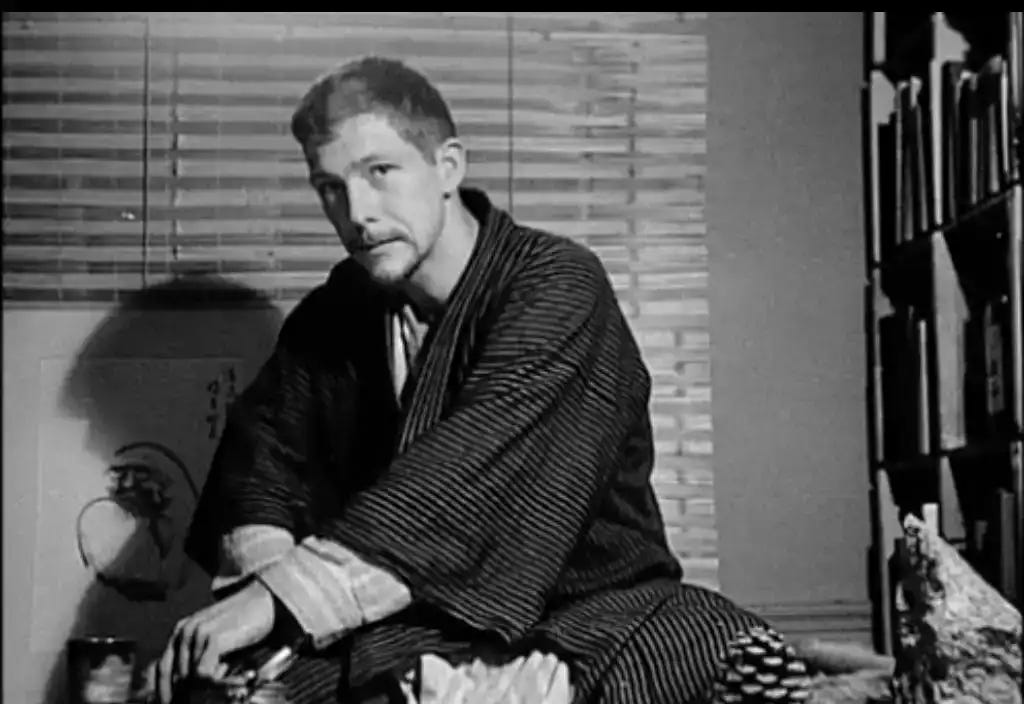Jack Kerouac's "Dharma Bums"
Our July Book Club pick celebrates adventure, Zen Buddhism, and summer in California
I only have one T-shirt of a book cover - and it’s Dharma Bums, by Jack Kerouac.
This was one of my favorite books in my 20s, and this summer, I feel it’s time for a throwback to this spiritually-infused adventure tale of bohemia and Buddhism in 1950s California.
Those of you’ve followed me for some time know I’m a major fan of the Beat Generation writers. I’m kind of a #BasicBeat.
Ever since I first picked up On the Road in college, I fell in love with the spirit of this post-war generation of bohemian writers who rejected the conformity of 1950s America in favor of finding a deeper meaning of life.

In a time when Senator Joseph McCarthy was leading a witch-hunt against supposed communists, homosexuals, and other “un-American” activities, the Beat Generation writers were traveling the world, studying the wisdom of ancient cultures, and actively integrating black and white America vis-a-vis their love of jazz music and the spontaneous self-expression it represented. And in the Bush era, this message of resistance and rebellion inspired me to find an alternative path outside of society.
And even though many see reading the Beats as a mere youthful phase, it’s clear that they influenced American society (and beyond) in countless ways. Without the Beats in the 50s, we would not have had the Hippies in the 60s, and the embrace of the counterculture by the Baby Boomers who shaped the liberal democracies of today.
The Beats have recently been subject to a lot of criticism — much of it warranted. Kerouac’s work was famously described by Truman Capote as “not writing at all -- it's typing." There are certain passages where this is valid. Kerouac’s love for free expression probably could have been improved with a bit more editing.
Furthermore, the Beats were undoubtedly a boy’s club that kept women writers on the margins and often expressed overt misogyny. Their descriptions of race can seem cringe today. Kerouac in particular is guilty of “essentializing” the very cultures he was trying to praise - specifically black America and Mexicans — by inadvertently reducing them to two-dimensional idealizations rather than living, breathing human beings. But judging their work through the prism of today fails to recognize how revolutionary these writers were in a time of repression, conformity, and segregation.
Nevertheless, much of what we now take as mainstream — interest in meditation, yoga, Eastern philosophy, psychedelics, and free-spirited travel — was first popularized by the Beats. And Dharma Bums in particular shows this bridge between East and West that now is fundamental to the fabric of the Bay Area where it’s set.
There are so many great books from the Beats - so why chose this one? After all, books like On The Road, The Naked Lunch, Tristessa, Mexico City Blues, Junky, and Queer were all written a few blocks from my house in Mexico City. On the Road in particular is considered the classic text of this era and concludes here in Mexico City.
I picked Dharma Bums not just because it’s been overshadowed by On the Road, which came a year before it. It’s also the Beat Generation book that impacted me the most.
I read Dharma Bums as a junior at UCLA, I was still trying to figure out what path to take in life. I studied politics to change the direction for my country, which was marred in the wars of Iraq and Afghanistan. I studied economics to please my father, who wanted me to be an investment banker. But Dharma Bums offered an alternative to the conformity of corporate America that ignited my desire to explore the world and complement what I learned in university with direct experience.
Like all of Kerouac’s books, Dharma Bums is a lightly fictionalized version of his real life experiences, with his fellow Beat Generation writers disguised with fake names. It tells the story of Kerouac navigating the explosive fame of On the Road by seeking spiritual truths through Zen Buddhism, which he was introduced to by the poet Gary Snyder (called “Japhy” in the book).
The book centers around Kerouac’s relationship with Snyder, who was not part of the original Beat Generation crew that formed in New York and was distinctly urban. Snyder was raised in the West and was an outdoorsman who had worked as a fire lookout in the North Cascades and a seaman on the seas. Lawrence Ferlinghetti described him as “the Thoreau of the Beat Generation.”
Dharma Bums chronicles their friendship from 1955-56, when they shared a cabin in Mill Valley as Snyder was studying Asian culture and languages at UC Berkeley, where he met Alan Watts (“Arthur Whane”). Snyder introduced Kerouac to the great mountains of the Sierra Nevada and the Northern Cascades, inspiring Kerouac to spend a summer as a fire watch lookout in an isolated cabin on Desolation Peak, as he had done for two summers before. Kerouac spent 63 days in the cabin, which he writes about in the book.
The story also portrays the infamous Six Gallery poetry reading in San Francisco, where Allen Ginsberg (“Alvah Goldbook”) debuted his legendary poem “Howl.” This event marked the birth of the San Francisco Renaissance and cemented San Francisco’s place as a countercultural capital of the United States.
I’m excited to revisit Dharma Bums to get back in touch with a book that truly made me who I am today. I don’t think I ever would have hitch-hiked across Europe, hopped trains in India, worked as a deckhand on ships, studied Buddhist philosophy, or attempted to become a writer if it weren’t for reading this book.
Kerouac’s depiction of Zen Buddhism in Dharma Bums is far from enlightened. He was a flawed man, and he knew it. And as I grow older, revisiting his books reflects my own growth back to me. He is no longer the demigod I once saw him to be. And yet, there is something in his writing that keeps that youthful spark of adventure alive within me. And I hope it sparks something within you as well.
This week marks the 1-year anniversary of The Missive on Substack, and as a token of my appreciation I want to offer you all 50% off my annual subscriptions this week only. If you’ve ever wanted to join our book club discussions and / or support my work, this is a great time do become a paying subscriber. This discount ends Friday, so get it while it lasts.
Happy reading - and if Kerouac’s work has also impacted you, let me know how in the comments below.
Best,
Marko
PS: Join the live Book Club discussion of Moldy Strawberries this Thursday






